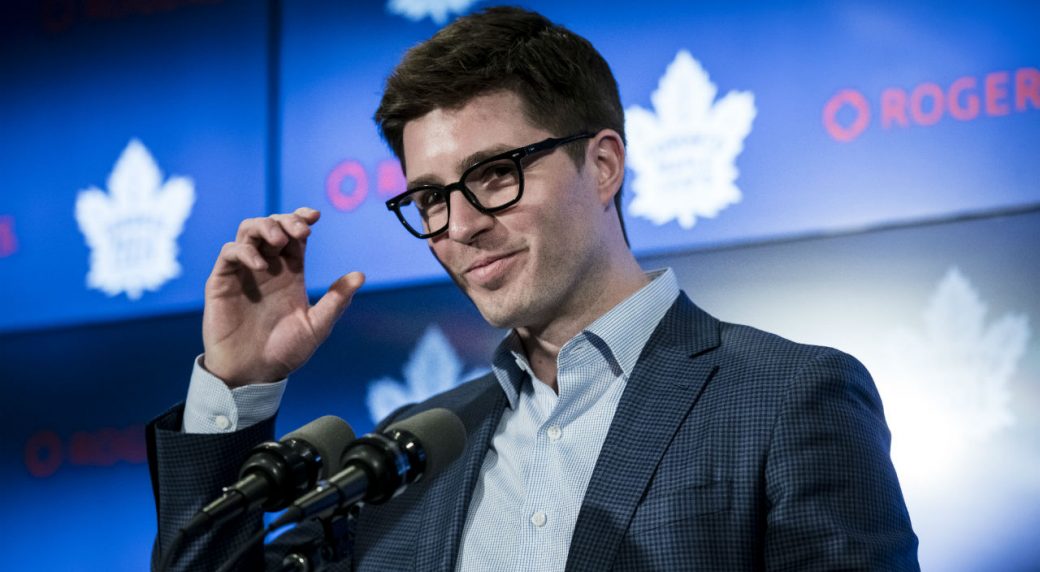Kyle Dubas joined TSN Overdrive on Monday evening to discuss the quiet trade deadline and the team’s current adversity with 19 games remaining in the 2019-20 regular season.
You didn’t make any big moves that will jolt your room. It wouldn’t seem to be a boost of confidence for your team. What kind of message were you sending to your team based on what you did or didn’t do leading up to the trade deadline?
Dubas: It is two things. Number one, we obviously want to see how the group responds — not just from Saturday, but from the last week, really. I know a lot of the attention will get paid to Saturday, and I think that is fine. It was obviously a very memorable embarrassment, and that is the way it goes sometimes. But I think all of last week there were three of the four games that we didn’t play near to our potential, and then one of the games we showed exactly what we are capable of. Three of the four in the wrong direction isn’t going to do it.
Because of the flashes we have shown, whether it is through December and even of late, we know what we are capable of when we are at our best. It is now how we are going to respond over the final 19 games and six weeks of the season? What are we going to do to pull ourselves out of where we have been and back into where we are capable of going?
The message is two-fold: Even though it is not an easy thing to say at this exact time, the belief in the group that is assembled is still very high. On the other side, it is also a great opportunity for this group to show how they can respond and what we can learn from the things that we have gone through recently and the poor play that has been a major talking point.
It would seem that Game 7 last year was supposed to do that for your team, or Game 7 the year before, or Game 6 against Washington. At what point do you stop as an organization thinking you still have to learn — that the expectation is your team should have learned it by now and you should be improved and playing much better than you have been?
Dubas: I think like everyone in management and athletics or in any business, you wish after one time that something doesn’t go your way, the group would perfectly understand those lessons and respond accordingly. I would say that the playoff disappointments are, in their own right, different. What I would say we have gone through is a much more prolonged stretch. It is not like it is one bad night. It is not like we went to Boston last April after having a chance to win at home and didn’t play to our potential. This has been an in-season, weeks-long sort of — one game really good, another game average or poor. I think our group, in developing that consistency in the season, going through this is something that will help us to build for every moment, not just playoff-related or going through slumps in a season.
I 100% agree with you. I wish that we went through one thing that sucked and we learned our lesson, whether it was against Washington or against Boston. The reality is, if you look at even some of those teams — whether it is Washington, St. Louis, whomever — and they’ve all had years of going through those things as well, where they lose in the playoffs, it is disappointing, and it sometimes takes longer than you really want. I’d love to go through one tough disappointment one Apri or May or June and then the next year, the lessons carry on, but it doesn’t often work that way, especially in sports. I am sure hoping this is another hard lesson for us and it is used to propel us where we need to go. It is a great opportunity for us to do so.
All of that said, I don’t disagree with the criticism that we should’ve learned from things in the past. We do need to be learning from them. We need to set ourselves up for the future.
You’ve mentioned focus and consistency, and that points more to the players than the architecture. Do you still believe the way you have built this team is a potential Cup-winning strategy in the NHL, or has any of this caused you to re-examine?
Dubas: I think the way I am is that I am always examining what we are doing every day. I have a general philosophy, but I am trying to learn something every day and apply it going forward, trying not to be stubborn and hard-headed about where, exactly, we are at. All of that said, I don’t have any wavering in my current situation in terms of the fact that when this team is at its best, it shows what it is capable of. You can look as recently as Thursday and see that.
One game in a stretch isn’t going to quell any of the concerns long term. We need to do that consistently and we need to do that all the time. That is what we are working toward now. In the end, when we talk about architecture and things like that, if it doesn’t work, that will be on me. I have enough belief in this situation and the way we have built this team and the way that we want to play that I am banking on that. It is me on the line, and that is fine. I can live with that and everything that comes with it.
In the press conference, you said you weren’t going to bullshit and pretend you know the answers about the root of the issue. How do you find out?
Dubas: The players have shown great response. We met with them on Wednesday after the game on Tuesday, and they came out and responded very well. I don’t know the exact things that cause us to go from the way that we played on Thursday night to the way that we played on Saturday night. The preparation, the schedule, the strategy that we use are all the same. Sheldon’s preparation is the same. His meeting schedule is the same. Because of the way the game went, it is something that you’re thinking about. We can’t start to change everything and begin to wildly rotate between doing things one way and then another. We have to stick with our planning and the way that we operate on a daily basis and go from there.
We have shown earlier in the year, as recently as two months ago, we are capable of prolonged stretches of play like that. It has only been recently that we have rotated between the two. It could be one of those ruts in the year we need to pull out of. That said, we won’t stop examining how we can possibly get better and more consistent on a daily basis and go from there.
It is obviously something that is on the players’ minds now. It is on the front burner in where we are at. We will see the response here this week in Tampa and again Thursday in Florida.
Jake Muzzin said the team reverts to wanting an easy game too often. Muzzin, having won it all, knows the game is hard. What do you make of that and what can you do to make your team not do it?
Dubas: For one, I don’t think Jake is wrong at all. I think he is 100% right. Everybody goes to work every single day regardless of what their job is and they’d like it to be easy. You’d like it to flow and for it to go by smoothly. There are days that you come to the rink and you feel great and the game plan is great. Everything kind of rolls through the game and you win the game. But is a very, very difficult league. The level of desperation at this time of year is much higher. As a result, the games do get harder at this time of year. Teams are much more prepared. They have been together longer and have found their form. Everyone is battling for different things.
For us, in those games that are much more difficult, we need to be able to find another level. We did that on Thursday against Pittsburgh and we didn’t do that on Saturday against Carolina. We know what we are capable of. It is now just getting into the mindset of every single night. I think that is a forced desperation because of the place we are at in the standings. We will see how the players respond and roll from there, but it is not going to be easy. It is going to be 19 very difficult games against teams of varying levels of motivation and things they are playing for. The vast majority of them are against teams very much still in the playoff hunt or battling for their division lead. It is going to be a great test for us to see where we are in that when we wake up on April 5th.
Your head coach has brought up your team being immature. How do you tell the difference between immature and unprofessional? There is a difference. Do you see it as immature? How do you determine between the two?
Dubas: I’ve never found the group is unprofessional. I found them to be, when they’re here and doing their work, their commitment to the performance program and the development work since we’ve ramped that up has been excellent. The way they approach the tactical coaching side of it with Sheldon and the individual work — I’ve never, ever watched that and found it to be an issue.
When Sheldon uses the term immature, when he uses it, it is always in the post-game. The times that we have been are the moments in the game where we allow… If we go back to Buffalo or Pittsburgh on the road, when one thing start to go bad, we allow them to snowball into two or three things. A more mature team is able to say, “Okay, one thing didn’t go our way. That sucked. Let’s take a deep breath here. Let’s gather ourselves. Let’s dig back in and get back at it.”
I don’t find the group is unprofessional at all. I find that in those moments especially, the examples are stark where we show that we have to be better. It’s come to mind now and I think it has become more of a public decry now because of the expectations of the group. The group is, for the most part, in its fourth year together, save for a few additions in John and Jake. It is in its fourth year and people are expecting some tangible progress. That hasn’t happened yet. When different things in the course of the game happen, the way to look at it is, whether it is growing up or finding our edge in that area or gaining maturity, those are the exact moments that stand out to me where we can be a lot better. Our coaching staff and leadership group spend a lot of time talking about it. Now have to stop talking and get going.
Do you think the core you have can learn that on their own through heartbreak, embarrassment — the different tests you have faced up to and including the playoffs? Do you think there needs to be more of a veteran leadership group or a different kind of leadership? Is there enough in your organization now to get them to where they need to go?
Dubas: I think the guys, even the younger guys, have good leadership qualities to them. They’re just young and they’re finding their way in the league and cementing their status. The one thing that we have always done, especially in times like this, is look outward and say, “Is this something that has to do with only us, or is this something that other teams have encountered a lot in the past in other sports? Is it simply an issue of our team and something we are doing as a program? Is it something we are allowing to seep inside?”
I think the reality is you wish after a disappointment or two it all gets figured out. But there are a number of examples in hockey and elsewhere where, if you stay patient and stay the course and the course shows that the talent is there and that the character is there, at some point, they will break through — whether that is through timely trades, or just general accrual of experience or greater disappointments or different things. To use hockey, you look at Washington and it is largely the same core that was there the whole time and finally, they breakthrough. I know they made different additions to the team over time, as all teams do. St. Louis had largely the same core — they added O’Reilly and a few other parts to put it over the edge.
For us, we have a belief in the group, not only because of their talent but what we know of them as people and their will and desire to have success here. That is tough to say coming off of the stretch that we’ve had and people will scoff at that and say, “How can that be? If that is true, how can they play that way?” In every sport, teams go through different ups and downs in their season. As we grow and evolve and continue to develop, we will be able to smooth those out and get to what we show when we are at our best.


































